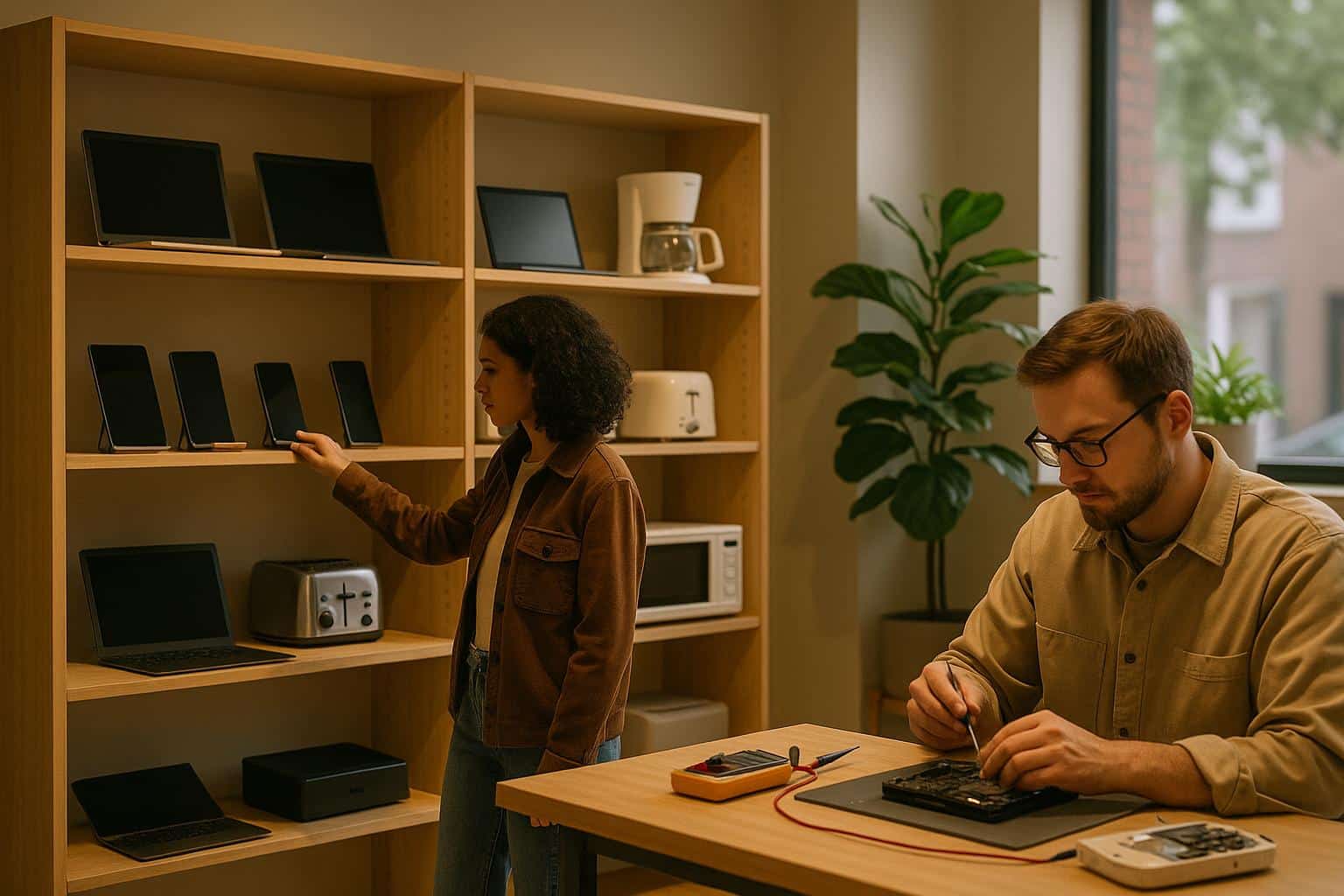Thrift stores are stepping up to help solve the growing issue of e-waste – discarded electronics like phones, computers, and TVs that often end up in landfills. These stores offer easy drop-off points for used electronics, keeping harmful materials like lead and mercury out of the environment. Here’s how they make a difference:
- Resell: Functional electronics are cleaned, tested, and sold at affordable prices.
- Repair: Items with minor issues are fixed and given a second life.
- Recycle: Non-repairable devices are sent to certified recycling facilities to recover valuable materials like gold and silver.
Stores like Goodwill and City Thrift also partner with certified recyclers to ensure proper handling and data security. Plus, proceeds from sales often fund community programs, from job training to housing support. By donating your old electronics, you can help reduce waste, provide affordable tech to others, and support local initiatives – all while protecting the planet.
How Thrift Stores Handle Electronics Donations
The Electronics Donation Process
When electronics are donated to thrift stores, they go through a detailed evaluation to determine their next steps. Most stores accept a variety of electronics, including computers, laptops, tablets, smartphones, televisions, gaming consoles, and small appliances like microwaves and coffee makers.
The process begins with staff inspecting each item for damage, missing parts, and general wear and tear. Items are then sorted based on their condition and type. Issues like cracked screens, water damage, and missing power cords are flagged as they can impact functionality and resale value. This sorting process helps stores decide whether an item should be resold, repaired, or recycled.
Thrift stores follow strict rules about what electronics they can accept. For instance, older CRT televisions are usually discarded due to their weight and the high cost of recycling them. Similarly, items with safety recalls or known hazards are immediately rejected.
Deciding What to Resell, Repair, or Recycle
Once electronics are sorted, thrift stores decide their fate – resell, repair, or recycle – based on their condition, functionality, and market demand. This approach balances environmental responsibility with the store’s ability to generate revenue.
- Resell: Electronics in good working condition with minimal wear, and all necessary components are cleaned, tested, and priced for sale. Examples include newer smartphones, functional laptops, gaming consoles, and small appliances.
- Repair: Items with minor issues that are cost-effective to fix, like laptops needing new hard drives or phones with cracked screens, are set aside for repairs. Many stores collaborate with local repair shops or have volunteer technicians to handle these tasks.
- Recycle: Electronics that are too damaged, outdated, or missing essential parts are sent to certified e-waste recycling facilities. These include items like broken televisions or devices with missing power supplies.
Market demand and storage space also play a role in these decisions. Even functional electronics may be recycled if they’ve been in inventory for too long or if storage is limited. This efficient system reduces waste and supports community programs through better resource management.
Protecting Personal Data on Donated Electronics
Data security is a top priority when handling donated electronics. Thrift stores have developed robust protocols to protect donors’ personal information while also educating the public on proper data removal.
Donors are typically asked to erase their devices before donating, but thrift stores have backup measures in place for items that still contain sensitive data. Staff are trained to identify devices like computers, smartphones, and tablets that may store personal information.
Depending on the device, stores use various methods to ensure data is destroyed:
- Hard drives are removed and physically destroyed.
- Mobile devices are reset to factory settings.
- Cloud accounts are checked to ensure they’ve been disconnected.
Many thrift stores provide step-by-step guides at donation points to help donors wipe their devices properly. These guides emphasize backing up important files before erasing data.
If a device cannot be wiped due to password locks or technical issues, it’s automatically sent for recycling rather than being resold. This cautious approach protects both donors and future buyers from potential data breaches, fostering trust in the donation process.
Working with Certified E-Waste Recycling Facilities
Choosing the Right Recycling Partners
When thrift stores select e-waste recycling partners, they carefully assess certifications and data security measures. Certifications like e-Stewards highlight excellence in recycling and refurbishment methods. For secure data destruction, recyclers with a NAID AAA certification are a top choice. These credentials not only reflect strong recycling standards but also reinforce a shared dedication to protecting the community and ensuring safety in handling sensitive information.
Benefits of Thrift Store E-Waste Recycling
Cutting Down on Landfill Waste and Preserving Resources
Thrift stores play a key role in giving electronics a second life through refurbishment and resale. This not only helps conserve valuable resources but also keeps unnecessary waste out of landfills. It’s a win-win: fewer environmental impacts and extended use of technology.
Providing Affordable Technology for Families
Refurbished electronics from thrift stores make technology more accessible for families who might struggle to afford new devices. As the US EPA explains,
“Donating electronics allows schools, nonprofit organizations, and lower-income families to obtain equipment that they otherwise could not afford”.
This effort bridges the digital divide and helps communities thrive.
How City Thrift Manages E-Waste Recycling
City Thrift’s Electronics Donation Process
City Thrift makes it easy for Kansas City residents to donate their unused electronics, helping both the environment and the community. At its Kansas City area locations, the organization accepts electronic donations and ensures they are either reused or responsibly recycled. This thoughtful process not only keeps electronics out of landfills but also supports meaningful community initiatives.
Supporting City Union Mission Through E-Waste Programs
Donated electronics sold through City Thrift‘s stores directly benefit City Union Mission, a nonprofit dedicated to helping individuals experiencing homelessness and poverty in Kansas City. Every donation contributes to reducing electronic waste while funding programs that provide essential services to those in need. City Thrift’s efforts go beyond just recycling – they’re about creating a ripple effect of positive change, addressing both environmental and social challenges at once.
Building Better Communities in Kansas City
City Thrift’s work is deeply rooted in its dedication to strengthening the Kansas City community. By offering a convenient and responsible way to recycle e-waste, they empower residents to make a difference. Additionally, they provide opportunities for community members to volunteer and engage in projects that promote environmental awareness and social impact. With several locations across the city, City Thrift not only simplifies recycling but also educates the community on how to manage electronics responsibly.
Through these initiatives, City Thrift showcases how local organizations can tackle environmental issues while supporting programs that uplift the community.
Thrift Stores Make E-Waste Recycling Work
Thrift stores are teaming up with e-waste recyclers to tackle two big challenges: reducing landfill waste and supporting community programs. This partnership not only keeps electronics out of landfills but also recovers useful materials and generates funds for social initiatives. Plus, it gives communities access to affordable, refurbished technology.
Take City Thrift in Kansas City, for example. They turn donated electronics into funding for City Union Mission’s programs that help people facing homelessness and poverty. It’s a local solution with a real impact – helping both the environment and vulnerable community members.
The key to this success lies with donors. When people understand that their old electronics can do more than just gather dust – like preventing harmful waste and supporting social causes – they become part of a sustainable system. It’s a win-win: protecting the planet while strengthening the community.
As e-waste continues to pile up across the country, thrift stores offer a practical, community-driven solution. They don’t need huge infrastructure or complex government programs to make a difference. By tapping into local networks, volunteers, and partnerships, thrift stores show that meaningful e-waste management starts right in your neighborhood, one thoughtful donation at a time.
FAQs
How do thrift stores protect personal data on donated electronics?
Thrift stores prioritize data security by following strict measures to remove personal information from donated electronics. They rely on certified methods like data wiping or physically destroying devices to ensure sensitive data is securely erased before the items are resold or recycled.
These procedures often align with industry standards, such as NIST SP 800-88, guaranteeing thorough and responsible data removal. This approach not only protects your privacy but also promotes eco-friendly e-waste recycling practices.
How do thrift stores decide whether to sell, repair, or recycle donated electronics?
Thrift stores assess donated electronics by focusing on three key aspects: condition, functionality, and safety. Items that are in good working order and meet safety requirements are usually resold. For those that are damaged but can be fixed, they may be refurbished and then sold. Electronics that are beyond repair are properly recycled to reduce waste and prevent harmful materials from ending up in landfills.
This thoughtful approach ensures that donated electronics are managed in a way that supports the community while also promoting environmentally friendly practices and cutting down on e-waste.
How does City Thrift use proceeds from selling refurbished electronics to benefit the community?
Proceeds from selling refurbished electronics at City Thrift play a key role in supporting local community initiatives aimed at addressing urgent needs. These funds go toward providing essentials like food assistance, safe shelters, and job training programs for individuals and families dealing with challenges such as homelessness and poverty.
When you shop at or donate to City Thrift, you’re doing more than just cutting down on electronic waste. You’re also helping fuel programs that make a real difference in the Kansas City area and beyond.






